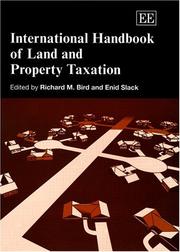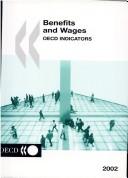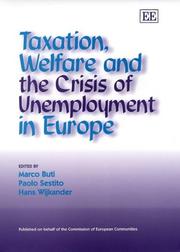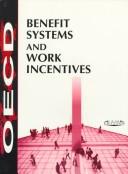| Listing 1 - 10 of 10 |
Sort by
|
Book
ISBN: 1283364387 9786613364388 9264120807 9264120599 Year: 2011 Publisher: Paris : OECD,
Abstract | Keywords | Export | Availability | Bookmark
 Loading...
Loading...Choose an application
- Reference Manager
- EndNote
- RefWorks (Direct export to RefWorks)
This publication examines the effects of taxation on employment, highlights the resulting policy challenges, and discusses the ways governments endeavour to address these challenges. Chapter 1 provides a broad overview of the effects of taxation on employment, examining how taxes on labour income can affect both the size of the labour force and the level of unemployment, and highlighting key areas of concern for tax policy makers. This analysis is then augmented in chapters 2-4 by the more detailed analysis of the effects of taxation on the employment of three groups where empirical research suggests that responses of labour supply to taxation may be relatively large: low-income workers, mobile highly-skilled workers, and older workers. As well as highlighting key areas of concern for tax policy makers, the report places a particular focus on the different measures that have been adopted by countries to attempt to overcome these problems, discussing, where possible, the main design features, and the advantages and disadvantages of the different approaches that have been adopted.
Employment (Economic theory). --- Fiscal policy. --- Labor supply -- Effect of taxation on. --- Manpower policy. --- Wages -- Taxation. --- Labor supply --- Fiscal policy --- Manpower policy --- Business & Economics --- Labor & Workers' Economics --- Effect of taxation on --- Effect of taxation on. --- Employment policy --- Human resource development --- Labor market --- Labor market policy --- Manpower utilization --- Tax policy --- Taxation --- Government policy --- Labor policy --- Trade adjustment assistance --- Economic policy --- Finance, Public

ISBN: 1280171553 9786610171552 9264015175 9264015159 Year: 2004 Publisher: Paris, Cedex, France : OECD,
Abstract | Keywords | Export | Availability | Bookmark
 Loading...
Loading...Choose an application
- Reference Manager
- EndNote
- RefWorks (Direct export to RefWorks)
The 2004 edition of Benefits and Wages provides results for 2001 and 2002.Unemployment and related welfare benefits help prevent those without work from falling into poverty but can at the same time reduce the incentive to work; this is one of the main dilemmas of social policy.
Employee fringe benefits -- OECD countries -- Periodicals. --- Labor supply -- Effect of taxation on -- OECD countries -- Periodicals. --- Manpower policy -- OECD countries -- Periodicals. --- Taxation -- OECD countries -- Periodicals. --- Employee fringe benefits --- Benefits, Employee --- Benefits, Fringe --- Employee benefits --- Fringe benefits --- Non-wage payments --- Perks (Employee fringe benefits) --- Perquisites (Employee fringe benefits) --- Compensation management --- Labor costs --- Wages

ISBN: 1843766477 Year: 2004 Publisher: Cheltenham : E. Elgar,
Abstract | Keywords | Export | Availability | Bookmark
 Loading...
Loading...Choose an application
- Reference Manager
- EndNote
- RefWorks (Direct export to RefWorks)
Land value taxation. --- Real property tax. --- Local finance. --- Land value taxation --- Effect of taxation on --- Real property tax --- #SBIB:043.IOS --- #SBIB:35H220 --- #SBIB:35H435 --- Council tax --- Land tax --- Land use --- Real estate tax --- Real property --- Taxation of real property --- Property tax --- Homestead exemptions --- Taxation of land values --- Single tax --- Financieel management bij de overheid: algemene werken --- Beleidssectoren: economisch en werkgelegenheidsbeleid --- Taxation
Periodical
ISSN: 19991339 Year: 2002 Publisher: Paris, France : OECD,
Abstract | Keywords | Export | Availability | Bookmark
 Loading...
Loading...Choose an application
- Reference Manager
- EndNote
- RefWorks (Direct export to RefWorks)
Comparative analyses (with tables) of tax and unemployment benefits in OECD countries.
Manpower policy --- Employee fringe benefits --- Labor supply --- Taxation --- Salarissen. --- Sociale uitkeringen. --- Employee fringe benefits. --- Manpower policy. --- Taxation. --- Effect of taxation on --- Effect of taxation on. --- OECD countries. --- Duties --- Fee system (Taxation) --- Tax policy --- Tax reform --- Taxation, Incidence of --- Taxes --- Employment policy --- Human resource development --- Labor market --- Labor market policy --- Manpower utilization --- Benefits, Employee --- Benefits, Fringe --- Employee benefits --- Fringe benefits --- Non-wage payments --- Perks (Employee fringe benefits) --- Perquisites (Employee fringe benefits) --- Labor force --- Labor force participation --- Labor pool --- Work force --- Workforce --- Government policy --- OECD member countries --- Organisation for Economic Co-operation and Development countries --- Finance, Public --- Revenue --- Labor policy --- Trade adjustment assistance --- Compensation management --- Labor costs --- Wages --- Human capital --- Labor mobility --- Manpower --- Law and legislation
Book
ISBN: 128174641X 9786611746414 9264032657 926402378X Year: 2007 Publisher: Paris : OECD,
Abstract | Keywords | Export | Availability | Bookmark
 Loading...
Loading...Choose an application
- Reference Manager
- EndNote
- RefWorks (Direct export to RefWorks)
Launched in 1998, the latest edition of this series (formerly entitled Benefit Systems and Work Incentives) provides detailed descriptions of all cash benefits available to those in and out of work as well as the taxes they are liable to pay across OECD countries. A special chapter also compares childcare costs across countries and the financial work incentives faced by parents of young children. Using the OECD tax-benefit models, total household incomes and their components are calculated for a range of family types and employment situations. The results are used to examine financial incentiv
Employee fringe benefits -- OECD countries -- Periodicals. --- Labor supply -- Effect of taxation on -- OECD countries -- Periodicals. --- Manpower policy -- OECD countries -- Periodicals. --- Taxation -- OECD countries -- Periodicals. --- Business & Economics --- Labor & Workers' Economics --- Manpower policy --- Employee fringe benefits --- Labor supply --- Welfare recipients --- Taxation --- Effect of taxation on --- Duties --- Fee system (Taxation) --- Tax policy --- Tax reform --- Taxation, Incidence of --- Taxes --- Public welfare recipients --- Labor force --- Labor force participation --- Labor pool --- Work force --- Workforce --- Benefits, Employee --- Benefits, Fringe --- Employee benefits --- Fringe benefits --- Non-wage payments --- Perks (Employee fringe benefits) --- Perquisites (Employee fringe benefits) --- Employment policy --- Human resource development --- Labor market --- Labor market policy --- Manpower utilization --- Government policy --- Finance, Public --- Revenue --- Poor --- Human capital --- Labor mobility --- Manpower --- Compensation management --- Labor costs --- Wages --- Labor policy --- Trade adjustment assistance

ISBN: 9264197842 9786610080496 1280080493 9264194479 Year: 2002 Publisher: Paris Organisation for Economic Co-operation and Development
Abstract | Keywords | Export | Availability | Bookmark
 Loading...
Loading...Choose an application
- Reference Manager
- EndNote
- RefWorks (Direct export to RefWorks)
Unemployment and related welfare benefits help prevent those without work from falling into poverty but at the same time, reduce the incentive to work; this is one of the main dilemmas of social policy. This annual report presents a description of all the benefits available to those without work, and of the taxes they pay, and presents a set of tables facilitating cross-country comparisons of tax-benefit systems. It compares the incomes of a range of families in and out of work in 1999 and describes the incentives to work, either part-time or full-time, across OECD countries.
salaires --- benefice --- marche du travail --- indicateurs conjoncturels --- pays de l'ocde --- AA / International- internationaal --- 336.212.1 --- 332.630 --- 368.44 --- 332.631 --- lonen --- winst --- arbeidsmarkt --- conjunctuurindicatoren --- oeso landen --- Belastingen op de bedrijfsinkomsten --- Strijd tegen de werkloosheid: algemeen. Theorie en beleid van de werkgelegenheid. Volledige werkgelegenheid. --- Werkloosheidsverzekering (sociale zekerheid). --- Werkloosheidsverzekering (werkgelegenheidsbeleid). --- Employee fringe benefits -- OECD countries -- Periodicals. --- Labor supply -- Effect of taxation on -- OECD countries -- Periodicals. --- Manpower policy -- OECD countries -- Periodicals. --- Strijd tegen de werkloosheid: algemeen. Theorie en beleid van de werkgelegenheid. Volledige werkgelegenheid --- Werkloosheidsverzekering (sociale zekerheid) --- Werkloosheidsverzekering (werkgelegenheidsbeleid)
Book
ISBN: 9264032665 9264023801 Year: 2007 Publisher: Paris : OCDE,
Abstract | Keywords | Export | Availability | Bookmark
 Loading...
Loading...Choose an application
- Reference Manager
- EndNote
- RefWorks (Direct export to RefWorks)
Manpower policy --- Employee fringe benefits --- Labor supply --- Taxation --- Effect of taxation on --- Duties --- Fee system (Taxation) --- Tax policy --- Tax reform --- Taxation, Incidence of --- Taxes --- Labor force --- Labor force participation --- Labor pool --- Work force --- Workforce --- Benefits, Employee --- Benefits, Fringe --- Employee benefits --- Fringe benefits --- Non-wage payments --- Perks (Employee fringe benefits) --- Perquisites (Employee fringe benefits) --- Employment policy --- Human resource development --- Labor market --- Labor market policy --- Manpower utilization --- Government policy --- Finance, Public --- Revenue --- Human capital --- Labor mobility --- Manpower --- Compensation management --- Labor costs --- Wages --- Labor policy --- Trade adjustment assistance
Periodical
ISSN: 2075230X Year: 1998 Publisher: Paris : OECD,
Abstract | Keywords | Export | Availability | Bookmark
 Loading...
Loading...Choose an application
- Reference Manager
- EndNote
- RefWorks (Direct export to RefWorks)
Comparative analyses (with tables) of tax and unemployment benefits in OECD countries and their potential effect on voluntary and involuntary unemployment.
Manpower policy --- Employee fringe benefits --- Labor supply --- Taxation --- Werkloosheid. --- Sociale zekerheid. --- Arbeidsmotivatie. --- Uitkeringen. --- Fiscale regelingen. --- Anreiz. --- Arbeitslosenunterstützung. --- Arbeitslosigkeit. --- Berufstätigkeit. --- Beschäftigungspolitik. --- Soziales System. --- Employee fringe benefits. --- Manpower policy. --- Taxation. --- Effect of taxation on --- Effect of taxation on. --- OECD countries. --- Aide sociale --- Travail, March ̌du, Effets des programmes de sčurit ̌du revenu sur le --- Travail, March ̌du, Effets de l'impt̥ sur le --- Impt̥ --- Duties --- Fee system (Taxation) --- Tax policy --- Tax reform --- Taxation, Incidence of --- Taxes --- Employment policy --- Human resource development --- Labor market --- Labor market policy --- Manpower utilization --- Benefits, Employee --- Benefits, Fringe --- Employee benefits --- Fringe benefits --- Non-wage payments --- Perks (Employee fringe benefits) --- Perquisites (Employee fringe benefits) --- Labor force --- Labor force participation --- Labor pool --- Work force --- Workforce --- Government policy --- OECD member countries --- Organisation for Economic Co-operation and Development countries --- Anreiz --- Arbeitslosenunterstützung --- Arbeitslosigkeit --- Berufstätigkeit --- Beschäftigungspolitik --- Soziales System --- Gesellschaftssystem --- Sozialsystem --- Soziokulturelles System --- Soziale Systeme --- Sozialsysteme --- Staatliche Beschäftigungspolitik --- Vollbeschäftigungspolitik --- Erwerbstätigkeit --- Erwerbslosigkeit --- Arbeitsloser --- Arbeitslosenfürsorge --- Incentive --- Anreize --- Unterstützung --- Travail, Marché du, Effets des programmes de sécurité du revenu sur le --- Travail, Marché du, Effets de l'impôt sur le --- Impôt --- Gesellschaftsordnung --- Kulturelles System --- Sozioökonomisches System --- Wirtschaftspolitik --- Arbeitsmarktpolitik --- Berufstätiger --- Arbeitsplatz --- Unterbeschäftigung --- Finance, Public --- Revenue --- Labor policy --- Trade adjustment assistance --- Compensation management --- Labor costs --- Wages --- Human capital --- Labor mobility --- Manpower --- Unemployment. --- Social security. --- Motivation. --- Benefits. --- Tax ruling. --- Staatliche Beschäftigungspolitik --- Vollbeschäftigungspolitik --- Erwerbstätigkeit --- Berufstätiger --- Law and legislation --- Public welfare --- Emploi --- Avantages sociaux --- Marché du travail --- Politique gouvernementale --- Effets de l'impôt sur --- Benevolent institutions --- Poor relief --- Public assistance --- Public charities --- Public relief --- Public welfare reform --- Relief (Aid) --- Social welfare --- Welfare (Public assistance) --- Welfare reform --- Human services --- Social service --- Unterbeschäftigung --- Sozioökonomisches System --- Arbeitslosenfürsorge --- Unterstützung --- Public welfare.

ISBN: 1840645113 9781840645118 Year: 2001 Publisher: Cheltenham: Elgar,
Abstract | Keywords | Export | Availability | Bookmark
 Loading...
Loading...Choose an application
- Reference Manager
- EndNote
- RefWorks (Direct export to RefWorks)
Labour market --- Taxes --- European Union --- Labor supply --- Welfare recipients --- Unemployment --- Income tax --- Marché du travail, Effets de l'impôt sur le --- Aide sociale --- Chômage --- Impôt sur le revenu --- Effect of taxation on --- Employment --- Bénéficiaires --- Travail --- Public welfare --- 331.5 <4> --- 331.56 <4> --- 316.323.65 --- 304 <4> --- #SBIB:023.IO --- #SBIB:35H435 --- #SBIB:35H437 --- #SBIB:33H13 --- #SBIB:33H16 --- 331.5 EUR --- #A0107A --- 451 Werkloosheid --- niveau de vie --- prosperite et bien etre --- chomage --- crise economique --- politique fiscale --- politique sociale --- europe --- EEC / European Union - EU -Europese Unie - Union Européenne - UE --- 331.31 --- 332.691 --- 336.61 --- 330.580 --- 368.40 --- 332.630 --- Europese Unie --- Nederland --- arbeid, loon --- arbeidsmarkt --- fiscaliteit --- welvaartseconomie --- werkgelegenheid --- werkloosheid --- 336.2 <4> --- 331.13794 --- -Welfare recipients --- -Unemployment --- -Public welfare --- -Income tax --- -Personal income tax --- Taxable income --- Taxation of income --- Direct taxation --- Internal revenue --- Progressive taxation --- Tithes --- Wages --- Benevolent institutions --- Poor relief --- Public assistance --- Public charities --- Public relief --- Public welfare reform --- Relief (Aid) --- Social welfare --- Welfare (Public assistance) --- Welfare reform --- Human services --- Social service --- Joblessness --- Employment (Economic theory) --- Full employment policies --- Manpower policy --- Right to labor --- Underemployment --- Public welfare recipients --- Poor --- Labor force --- Labor force participation --- Labor pool --- Work force --- Workforce --- Labor market --- Human capital --- Labor mobility --- Manpower --- Arbeidsmarkt. Werkgelegenheid --(algemeen)--Europa --- Werkloosheid. Arbeidsreserve--Europa --- Verzorgingsstaat. Welvaartsstaat --- Sociale politiek. Maatschappelijke opbouw. Sociale problemen, vraagstukken--Europa --- Beleidssectoren: economisch en werkgelegenheidsbeleid --- Beleidssectoren: sociale zekerheid --- Economische politiek --- Publieke financiën --- levensstandaard --- welvaart en welzijn --- economische crisis --- fiscaal beleid --- sociale politiek --- europa --- Economisch beleid. --- Evolutie van de arbeidsmarkt. --- Financieel beleid. --- Gecontroleerde economie. Geleide economie. Welvaarststaat. Algemeenheden. --- Sociale voorzorg en verzekeringen. Sociale zekerheid: algemeenheden. --- Strijd tegen de werkloosheid: algemeen. Theorie en beleid van de werkgelegenheid. Volledige werkgelegenheid. --- -Employment --- -Taxation --- Government policy --- -Arbeidsmarkt. Werkgelegenheid --(algemeen)--Europa --- -331.5 <4> --- 304 <4> Sociale politiek. Maatschappelijke opbouw. Sociale problemen, vraagstukken--Europa --- 331.56 <4> Werkloosheid. Arbeidsreserve--Europa --- 331.5 <4> Arbeidsmarkt. Werkgelegenheid --(algemeen)--Europa --- 316.323.65 Verzorgingsstaat. Welvaartsstaat --- -316.323.65 Verzorgingsstaat. Welvaartsstaat --- Personal income tax --- -Government policy --- Marché du travail, Effets de l'impôt sur le --- Chômage --- Impôt sur le revenu --- Bénéficiaires --- Gecontroleerde economie. Geleide economie. Welvaarststaat. Algemeenheden --- Economisch beleid --- Strijd tegen de werkloosheid: algemeen. Theorie en beleid van de werkgelegenheid. Volledige werkgelegenheid --- Evolutie van de arbeidsmarkt --- Financieel beleid --- Sociale voorzorg en verzekeringen. Sociale zekerheid: algemeenheden --- Taxation --- Labor supply - Effect of taxation on - European Union countries --- Welfare recipients - Employment - European Union countries --- Unemployment - European Union countries --- Public welfare - European Union countries --- Income tax - European Union countries

ISBN: 9264260730 9264263284 Year: 1998
Abstract | Keywords | Export | Availability | Bookmark
 Loading...
Loading...Choose an application
- Reference Manager
- EndNote
- RefWorks (Direct export to RefWorks)
Les indemnités de chômage et les prestations sociales annexes visent à aider les personnes privées d'emploi à ne pas tomber dans la pauvreté, mais en même temps, elles les découragent dans une certaine mesure de travailler. Tel est l'un des grands dilemmes que la politique sociale doit résoudre. Dans cette publication est analysée pour la première fois l'interaction complexe qui s'exerce entre système d'imposition et système de prestations sociales pour des catégories de familles et des situations professionnelles très diverses. Grâce à cet ouvrage, le lecteur pourra connaître avec précision les caractéristiques des systèmes d'imposition et de prestations qui ont un effet de contre-incitation au travail; tout l'éventail des prestations offertes aux personnes sans emploi et les impôts qu'elles acquittent y sont comparés avec le revenu qu'elles pourraient avoir si elles travaillaient. Dans certains pays, le revenu lié à l'emploi n'est guère plus élevé que les prestations servies à ces personnes. Il arrive aussi que le montant de certaines prestations soit réduit à mesure que le salaire augmente, si bien qu'il est moins tentant pour les bénéficiaires de chercher à progresser sur le plan professionnel. Les familles qui connaissent le chômage et subissent ces effets démobilisateurs peuvent finir par s'enfermer dans cette situation et risquent alors de se voir exclues du marché du travail.
marche du travail --- revenus --- politique fiscale --- politique sociale --- chomage --- securite sociale --- pays de l'ocde --- AA / International- internationaal --- 332.630 --- 336.212.1 --- 368.44 --- 332.631 --- arbeidsmarkt --- inkomens --- fiscaal beleid --- sociale politiek --- werkloosheid --- sociale zekerheid --- oeso landen --- Strijd tegen de werkloosheid: algemeen. Theorie en beleid van de werkgelegenheid. Volledige werkgelegenheid. --- Belastingen op de bedrijfsinkomsten --- Werkloosheidsverzekering (sociale zekerheid). --- Werkloosheidsverzekering (werkgelegenheidsbeleid). --- Income maintenance programs --- Means tests --- Public welfare --- Unemployment insurance --- Welfare recipients --- Public welfare recipients --- Poor --- Insurance, Unemployment --- Unemployment benefits --- Unemployment compensation --- Insurance --- Benevolent institutions --- Poor relief --- Public assistance --- Public charities --- Public relief --- Public welfare reform --- Relief (Aid) --- Social welfare --- Welfare (Public assistance) --- Welfare reform --- Human services --- Social service --- Assets tests (Means tests) --- Eligibility determinations (Means tests) --- Entitlement determinations (Means tests) --- Income tests (Means tests) --- Means testing --- Economic security --- Income transfer programs --- Transfer payments --- Family allowances --- Guaranteed annual income --- Social security --- Employment --- Government policy --- Strijd tegen de werkloosheid: algemeen. Theorie en beleid van de werkgelegenheid. Volledige werkgelegenheid --- Werkloosheidsverzekering (werkgelegenheidsbeleid) --- Werkloosheidsverzekering (sociale zekerheid) --- Testing --- Basic income --- Taxation. --- Labor supply --- Taxation --- Duties --- Fee system (Taxation) --- Tax policy --- Tax reform --- Taxation, Incidence of --- Taxes --- Finance, Public --- Revenue --- Effect of taxation on.
| Listing 1 - 10 of 10 |
Sort by
|

 Search
Search Feedback
Feedback About UniCat
About UniCat  Help
Help News
News